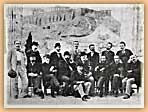 |

The 19th century is the period of organization of the Greek state.
This process was closely related to the formation of a Greek national identity, and this national identity in turn was determined by a number of cultural and intellectual factors which characterize the sense of participation in a national unity and underline its cohesion. Therefore, in these years cultural matters took in the fields of dialogue and opposition, the results of which made a very significant contribution to the period.
The language question, the aesthetic and morphological directions that the domestic literature would take in the course of its development, the pattern of towns with the structural and architectural choices that had do be made, the content of drama and the style of music, none of these were regarded as strictly aesthetic or artistic matters. This change in cultural matters marked the course of Greek society as a whole;
that is why we see elements of economic and political life reflecting the cultural conversation and in turn benefiting from it. The case of the jurist, politician and governor of the National Bank, Pavlos Kalligas, who wrote one of the first novels dealing with the reality of his time and the problems of Greek society, Thanos Vlekas, is characteristic.
The debate on cultural matters was marked by intense disputes.
The most important one was between the scholars of the Heptanesian School and the First Athenian School. The main choices that had already been made in the 1820s by Kalvos and principally by Solomos in the language, forms of expression and sources of inspiration did not affect the poets of the capital. Further development of the demotic was held back by the prevalence of the katharevousa (the purist Greek language) which, over time, became increasingly concerned with archaizing the language.
One example is Solomos, whose quest for subjects and forms of expression through the language of simple people, popular songs and the epics of the Cretan tradition, was either not mentioned or was publicly criticized. The accusations against the Zakynthian poet were that he neglected the 'virtues' of the katharevousa while trying to express himself poetically with a mediocre linguistic organ, the popular language. The poetic contribution of Solomos and of the Heptanesian School in general remained on the sidelines of the Athenian effort for the greater part of the period. The atmosphere would change much later with the appearance of Kostis Palamas in literature.
With two of his texts (released in 1886 and 1889) K. Palamas contributed to the acknowledgement of the poets of the Heptanesian School, mainly Solomos and Kalvos, and paid tribute to their linguistic organ, the demotic Greek language.
|


 |